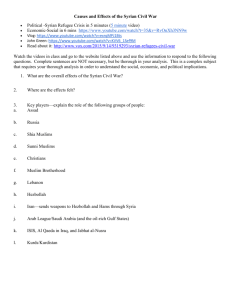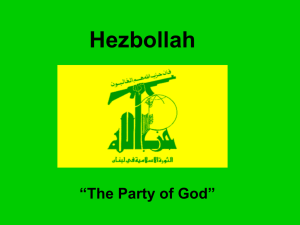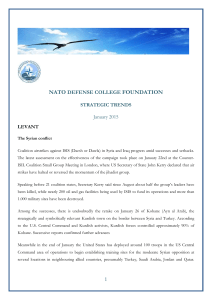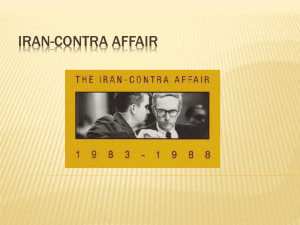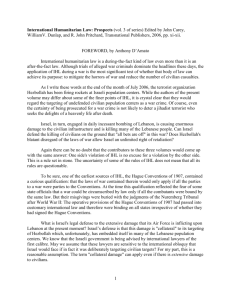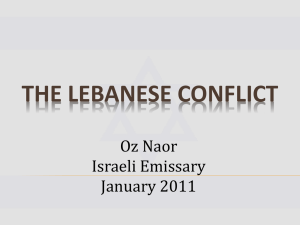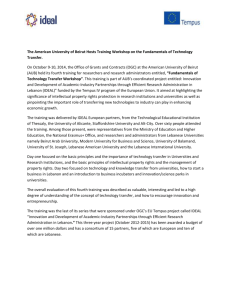Anti-Americans on the March
advertisement
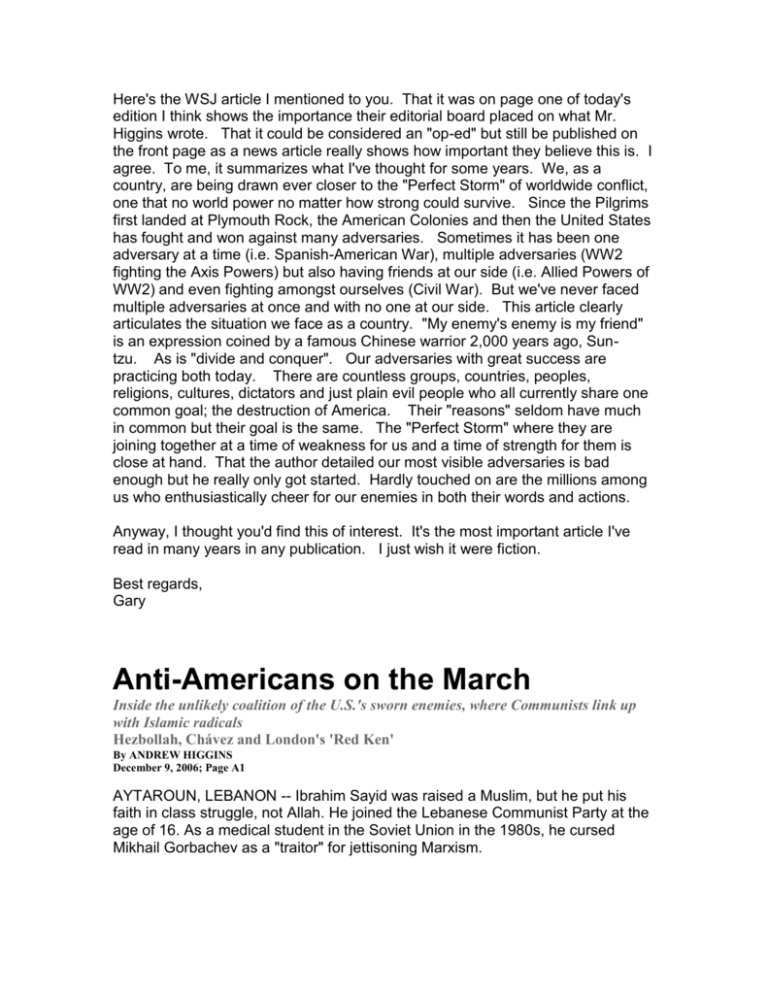
Here's the WSJ article I mentioned to you. That it was on page one of today's
edition I think shows the importance their editorial board placed on what Mr.
Higgins wrote. That it could be considered an "op-ed" but still be published on
the front page as a news article really shows how important they believe this is. I
agree. To me, it summarizes what I've thought for some years. We, as a
country, are being drawn ever closer to the "Perfect Storm" of worldwide conflict,
one that no world power no matter how strong could survive. Since the Pilgrims
first landed at Plymouth Rock, the American Colonies and then the United States
has fought and won against many adversaries. Sometimes it has been one
adversary at a time (i.e. Spanish-American War), multiple adversaries (WW2
fighting the Axis Powers) but also having friends at our side (i.e. Allied Powers of
WW2) and even fighting amongst ourselves (Civil War). But we've never faced
multiple adversaries at once and with no one at our side. This article clearly
articulates the situation we face as a country. "My enemy's enemy is my friend"
is an expression coined by a famous Chinese warrior 2,000 years ago, Suntzu. As is "divide and conquer". Our adversaries with great success are
practicing both today. There are countless groups, countries, peoples,
religions, cultures, dictators and just plain evil people who all currently share one
common goal; the destruction of America. Their "reasons" seldom have much
in common but their goal is the same. The "Perfect Storm" where they are
joining together at a time of weakness for us and a time of strength for them is
close at hand. That the author detailed our most visible adversaries is bad
enough but he really only got started. Hardly touched on are the millions among
us who enthusiastically cheer for our enemies in both their words and actions.
Anyway, I thought you'd find this of interest. It's the most important article I've
read in many years in any publication. I just wish it were fiction.
Best regards,
Gary
Anti-Americans on the March
Inside the unlikely coalition of the U.S.'s sworn enemies, where Communists link up
with Islamic radicals
Hezbollah, Chávez and London's 'Red Ken'
By ANDREW HIGGINS
December 9, 2006; Page A1
AYTAROUN, LEBANON -- Ibrahim Sayid was raised a Muslim, but he put his
faith in class struggle, not Allah. He joined the Lebanese Communist Party at the
age of 16. As a medical student in the Soviet Union in the 1980s, he cursed
Mikhail Gorbachev as a "traitor" for jettisoning Marxism.
Today, back in his home village just a few hundred yards from Israel, Dr. Sayid,
44, still has little time for Islam. He is married to a Christian and shuns the local
mosque, badly damaged when Israeli troops stormed into Lebanon this summer.
Instead of communism, he has embraced a new cause: Hezbollah, the militia and
social movement rooted in Shiite Islam. The Party of God, as it is translated into
English, is led by turbaned clerics and aided by the Islamic Republic of Iran,
which has ruthlessly persecuted communists.
"We all have the same goals," explains Dr.
Sayid, who now works in a Hezbollah clinic.
The first of these goals is "resistance" against
Israel, which during the summer war battled
Hezbollah militiamen just outside Dr. Sayid's
village. He says resistance also has a broader
target: America, its allies in the Arab world
and beyond, and global capitalism.
When the Cold War ended a decade and a
half ago with the collapse of the Soviet Union,
Mr. Sayid and others like him around the
world mourned the apparent triumph of U.S.
military, economic and ideological might.
At a Damascus rally, protesters carry Many Americans rejoiced, with some
embracing the theory that the demise of
pictures of Latin American
Marxism marked "the end of history," a period
revolutionary Che Guevara and
when ideological conflicts would give way to a
Hezbollah leader Sheik Hassan
world united in acceptance of a model typified
Nasrallah.
by the U.S.
Al Qaeda's attacks on New York and Washington in September 2001 didn't
fundamentally alter this conviction. Political Islam was seen as a grave threat but
seemed limited in its appeal by its dependence on religious zeal. Such
assumptions are now under strain as secular rebels, antiglobalization militants
and other strains of revolt rally to the banner of "resistance" offered by Islamist
groups such as Hezbollah.
Religion, excoriated by Karl Marx as the "opiate of the masses," has become a
great mobilizing force -- even for zealous atheists. The phenomenon extends
beyond the Middle East to Europe, Latin America and Africa, too. Causes that a
few years ago seemed moribund or at least passé -- socialism, Third World
solidarity, strident anti-Americanism -- have been injected with the fervor, though
rarely the actual faith, of Islamic radicalism.
FELLOW TRAVELERS
1
Western leftists, rightists and secularists have had a long and checkered
relationship with Islamists. See a timeline2 of historical highlights.
"We are all here to fight American hegemony," Naim Qassem, Hezbollah's
deputy chief, told hundreds of secular activists from around the world who
gathered last month in a Beirut conference center. They were there to
celebrate his Islamic movement's "divine victory" over Israel this summer
and cheer a broader battle against America's vision for the world. Mr.
Qassem was dressed in flowing robes and a cleric's turban. Many in his
audience wore T-shirts or badges featuring portraits of Che Guevara,
clenched fists and other emblems of secular radical chic.
Adding to its revolutionary cachet, Hezbollah is now battling to oust
Lebanon's pro-American government. Along with assorted allies, the
Islamist group staged a huge peaceful rally in central Beirut Dec. 1 and is
the driving force behind a mass sit-in near the offices of Prime Minister
Fuad Siniora, a pro-business former banker. The protesters, encamped in
tents for a week now, vow to stay until the government falls. Stoking fears
the showdown may spiral into serious violence, Hezbollah has called for
another mass demonstration Sunday.
Some of Hezbollah's biggest fans are in Europe. There, the hard left,
demoralized by the collapse of communism, has found new energy, siding
with Islamist militants in Lebanon, in Iraq and in a wider campaign against
what they see as an American plot to impose unrestrained free-market
capitalism.
"We are all Hezbollah now," read posters carried through London this
summer during an antiwar protest march. Earlier, London Mayor Ken
Livingston, once known as "Red Ken," invited a controversial Egyptian
cleric to the British capital, arguing that his views have been distorted by
the West.
In deeply Roman Catholic Latin America, Hugo Chávez of Venezuela has
become the exemplar of a new populism that sees common cause with Iran
and Hezbollah. Mr. Chávez, re-elected in a landslide last Sunday, has met
Iranian President Mahmoud Ahmadinejad several times and this summer
was given the Islamic Republic Medal, Iran's highest honor. Amid the
rubble of Beirut's southern suburbs, a Hezbollah stronghold, portraits of
Mr. Chávez now hang alongside pictures of Hezbollah leader Hassan
Nasrallah. Hezbollah put them up after Mr. Chávez denounced President
Bush as the devil in a September speech to the UN. "Gracias Chávez," they
say.
Africa, too, is boarding the bandwagon. A summit of the 53-nation African
Union this summer in Gambia featured two special guests: Mr. Chavez and
Mr. Ahmadinejad. Back in Tehran, Mr. Ahmadinejad in November hosted
Zimbabwe's authoritarian Prime Minister Robert Mugabe, an erstwhile
devotee of Mao Zedong. Fulminating against President Bush and British
Prime Minister Tony Blair, Mr. Mugabe said likeminded countries must
"fight against these evil men and their evil systems."
In the U.S., the principal target for both Islamist and leftist anger, there has
been little sign of any ideological realignment of the kind seen elsewhere.
The anti-American movement overseas poses scant immediate threat to
U.S. pre-eminence. Still, it could complicate American diplomacy,
particularly in the Middle East, where the Iraq Study Group and others are
urging Washington to reach out to Iran and Syria, both vocal foes. It also
risks emboldening America's many critics in Europe and Latin America,
aggravating friction on a host of issues from the Israel-Palestine dispute to
trade.
With America's reputation badly blemished across much of the globe,
widespread anger at Washington's foreign policy is fusing with local
grievances in an unstable mix of discontent. The result is a motley
assemblage rife with contradictions and competing agendas. The Islamistled protest movement has none of the central organization once provided
by the Comintern, the body set up by Vladimir Lenin to coordinate global
communism. Nonetheless, it is giving voice and a sense of common cause
to those opposed to America's plans.
Leading the way in embracing it are mostly fringe groups with names
redolent of the 1960s: The Global Peace and Justice Coalition, The
Socialist Workers Party, The League for the Fifth International. While such
outfits are quirky, they "magnify trends in the mainstream," says Nick
Cohen, a British writer who is publishing a book next year about the
alliance between Islamists and leftists, "What's Left?" Karl Marx, he says,
would be horrified.
"The sight of Godless communists in alliance with Islamo-fascists is one of
the wonders of the modern world," Mr. Cohen says.
Mainstream left-of-center parties still generally shun Islamists but chunks
of their support base don't. Mr. Blair in Britain, for example, has come
under fire within his own Labour Party for supporting President Bush's
troubled Middle East policy, which critics say demonizes Islamist groups.
In Spain, the socialist prime minister, José Luis Rodríguez Zapatero, has
reached out to Muslims, propounding what he calls "an alliance of
civilizations" and voicing sympathy for Hamas and Hezbollah. He has good
relations with Mr. Chávez, Fidel Castro of Cuba and Bolivia's populist
leader, Evo Morales.
At the Beirut conference last month, a Mexican Marxist denounced America
for "colonizing" New Mexico. A South Korean foe of free trade raged
against American beef. A Turk fumed about American military bases. A
Frenchman denounced American genetically engineered foods and the
North Atlantic Treaty Organization. There were even a few Americans. One
thundered against big business, another against the Federal Bureau of
Investigation.
A big part of Hezbollah's appeal is simply that, unlike other tarnished icons
of revolt, it can point to successes. It has defied Israel's military, by far the
region's most powerful. It prodded Israel to end its 18-year occupation of
southern Lebanon in 2000 and unexpectedly bloodied Israeli troops in
clashes this summer.
Hezbollah shows that "resistance," whether fuelled by religion or secular
zeal, "can break governments and roll back the American project," says
John Rees, a former editor of the journal International Socialism and a
leader of Britain's anti-Iraq war movement. Hezbollah, he says, isn't a
terrorist outfit but a social movement seeking better living conditions for
its supporters. "It is better to think of it as an AFL-CIO with guns," he says.
An American who traveled to Beirut in November to cheer Hezbollah, who
identified himself as Bill Cecil, summed up the appeal of Islamism to nonMuslims: "Your enemy is our enemy; your victory is our victory," he told a
conference. Mr. Cecil, an activist for a radical group in New York, later
appeared as a guest on the breakfast show of Hezbollah's television
station, al-Manar. America, he told a veiled female presenter, is "not a
democracy ... but a dictatorship of giant corporations." America "needs a
government that provides for the people
like Hezbollah helps people here."
Nowhere is the Islamist-leftist axis more
potent than in Lebanon. The three-day
Beirut jamboree, which featured fiery antiAmerican oratory and field trips to
buildings bombed by Israel, was hosted
jointly by Hezbollah and the Lebanese
Communist Party, once-bitter enemies now
united by what they proclaim as common
goals.
Sitting beneath a portrait of Argentine
Venezuelan President Hugo Chavez
revolutionary Che Guevara in his Beirut
(left) and Iranian President Mahmoud
office, Khaled Hadadeh, the general
Ahmadinejad make a clenched-fist
secretary of the Lebanese communists,
salute during a trip to the Orinoco
admits that Hezbollah and the Communist
River basin in southeastern
Party hated each other for years. "We
Venezuela to witness the opening of a
started out in blood," says Mr. Hadadeh, a
new oil well in September.
Sunni Muslim by birth but now a firm
atheist. Che Guevara, he says, "is our symbol, like Jesus Christ or
Mohammed."
Hostility to Israel and the U.S. now trumps past differences. The
Communist Party disbanded its own armed wing at the end of Lebanon's
civil war in 1990, but 12 of its members died fighting alongside Hezbollah
this summer, Mr. Hadadeh says. Piled in the corner of his office are
trophies of this summer's war: an Israeli army helmet, an Israeli rifle and a
Hebrew newspaper.
Mr. Hadadeh says he has met Mr. Nasrallah 15 times and admires him
greatly. At their most recent meeting in a secret location this fall, he says,
they discussed not just the recent war with Israel but also the need to
develop "a counter-project to the neo-liberal model," the free-market
policies backed by Washington.
Responsible for working out what this might mean is Ali Fayad, a political
science lecturer and head of Hezbollah's in-house think-tank, the
Consultative Center for Studies and Documentation. Mr. Fayad, who joined
Hezbollah in the 1980s while still a student, now sits on the politburo of an
organization that mimics the rigidly hierarchical structure of the Soviet
Communist Party. Israeli bombs destroyed Mr. Fayad's offices, so his
center now works from new premises in a half-built apartment block. Wellversed in Western economic and political theory, he runs a staff of more
than a dozen researchers and has led the militant group's outreach to
foreign supporters.
Part of Hezbollah's appeal lies in its tactical flexibility. Unlike many Sunni
Muslim radical groups such as al Qaeda, which denounce non-Muslims and
even many fellow Muslims as heretics who must be shunned or punished,
Hezbollah's Shiite leadership doesn't care if its allies include atheists, Mr.
Fayad says. "That is their problem not ours," he says, so long as "we have
the same political position."
The friction between the two branches of Islam surfaced at the recent
Beirut meeting. A Sunni Muslim from Jordan had to be ejected from the hall
after he started cursing Iran -- Hezbollah's main sponsor -- for aiding Shiite
militias in Iraq. Hezbollah's foreign fans watched in dismay as Shiite and
Sunni attendees screamed at each other.
Despite such volatile tensions, Mr. Fayad still sees Islam derailing
America's ambitions. Hezbollah's success in Lebanon, the debacle in Iraq
and the victories of populist anti-American politicians in Latin America, he
says, show that "it is now the end of 'the end of history.' " A recent article
by Richard Haass, former director of policy planning at the U.S. State
Department, has strengthened his conviction that America is in retreat, Mr.
Fayed says. Writing in the U.S. foreign-policy journal Foreign Affairs, Mr.
Haass declares that America's post-Cold War hopes for the Middle East
have failed and that the region's "American era...has ended." Mr. Fayad is
in no doubt about what comes next: "It is an Islamic era in the Middle
East."
Among those grappling with this new perception of reality is Joseph
Samaha, a secular Christian, former radical socialist and one of Lebanon's
most-thoughtful intellectuals. Over the summer he became editor in chief
of Al Akhbar, a new newspaper sympathetic to Hezbollah. He scoffs at
Westerners who cheer radical Islam as "naïve." But he concedes that
Islamists now represent the only viable alternative to corrupt, authoritarian
regimes in Egypt, Saudi Arabia and elsewhere. "It is sad, but it is like that,"
he says.
The ideological reshuffling marks a curious reprise: Russia's early
Bolshevik leaders, many of them Jewish, worked hard to cultivate Muslims,
seeing them as a useful ally against Britain and other European colonial
powers then ruling over large Muslim populations, notably in India and
Indonesia. The alliance led to doctrinal gymnastics as Soviet theorists
sought to reconcile atheism with the Quran. Some even argued that the
Prophet Mohammed was a precursor of Karl Marx.
For much of the 20th century, however, the left and Islam were bitter
enemies. Spain's right-wing dictator, Gen. Francisco Franco, recruited
Moroccan Muslims to fight Soviet-backed foes in the Spanish Civil War in
the 1930s. In 1962, Saudi Arabia, worried by Egypt's tilt toward Moscow,
created the Muslim World League to rally Islam against communism. Three
years later, Islamic groups in Indonesia joined in an army-led mass
slaughter of communists. Anticommunist fervor reached its peak in the
1980s, when thousands of Muslims flocked to Afghanistan to battle the
Soviet occupiers.
Much the same enmity existed in Lebanon. When Dr. Sayid, the surgeon,
first joined the Lebanese Communist Party in the late 1970s, Mr. Nasrallah,
now Hezbollah's leader, also was getting into politics -- partly out of
disgust at the spread of atheistic communism.
In an autobiographical account of his early years published in an Iranian
newspaper, Mr. Nasrallah recounts how his own village was "turning into
an area for the activity of intellectuals, Marxists and especially supporters
of the Lebanese Communist Party." He left the village and joined a group
called Amal, a Shiite organization.
Iran's Islamic revolution of February 1979 and the Soviet invasion of
Afghanistan at the end of that year soured communist-Islamist relations
further, provoking often-bloody clashes in Lebanon and elsewhere.
Iran's new Islamic government launched a brutal crackdown on the Sovietbacked Tudeh party, a leftist group that had helped topple the Americanbacked Shah. And Iran sent Revolutionary Guard zealots to Lebanon to
help set up Hezbollah and injected the new group with their own fierce
enmity to atheism and communism.
Israel's invasion of Lebanon in 1982 accelerated the rise of Islamist groups.
It uprooted Yasser Arafat's secular Palestine Liberation Organization,
which had bases in Lebanon, and left Hezbollah as the main force of
"resistance."
Dr. Sayid moved to Minsk in the then-Soviet republic of Belarus to study
medicine. He says he went there as a true believer and was appalled when
Mr. Gorbachev began his program of "perestroika," or economic
restructuring, and the Soviet system started to unravel. The reforms, he
says, were a "counter-revolution."
In Lebanon, meanwhile, a vicious civil war raged. Moscow put its weight
behind the nominally socialist and mostly secular forces of Walid Jumblatt,
leader of the country's small Druze sect, an offshoot of Islam. In Dr. Sayid's
village and other areas of southern Lebanon, previously strong support for
the Lebanese Communist Party wilted as Hezbollah became the dominant
force. Hezbollah's reputation was boosted by its fierce resistance to Israel
and its provision of medical care and other services.
In its first public manifesto issued in 1985, Hezbollah declared itself hostile
to "both the USSR and the U.S., both capitalism and communism, for both
are incapable of laying the foundations for a just society." Though focused
on the struggle with Israel, the manifesto also sought a wider audience,
addressed to "all the Oppressed of Lebanon and the World." Eventually the
Lebanese Communists began cooperating with Hezbollah, attracted mainly
by its power but also finding common cause in its emphasis on
championing the poor.
Amid the unraveling of the Soviet Union, few outside Lebanon paid much
attention to the global pretensions of Hezbollah. Then came the al Qaeda
attacks on America of 2001. Washington, traumatized, launched a "war on
terror" against what it viewed as a small group of homicidal religious
zealots.
As anger at the U.S. mounted in 2003 ahead of the invasion in Iraq, the
snowballing antiwar movement took on a curious aspect, particularly in
Europe: an alliance of forces that previously loathed each other.
Mr. Rees, the British radical who attended last month's Beirut conference,
played a big role, allying his own organization, the Socialist Workers Party,
with the Muslim Association of Britain, a group that says it wants to bridge
Muslim and non-Muslim communities yet is accused by critics of siding
with radical Islamic groups. The two organizations spearheaded the antiwar
campaign in Britain. Today, Mr. Rees says he has reservations about some
of his Islamic allies' views, particularly those regarding women and
homosexuals.
"If there were a level playing field, I might choose different allies," he says.
But he says America's own policies left him with no choice: "I find myself
on the same side as Hezbollah, as Chávez. I didn't choose them. America
did."
At a big Islamic festival this summer supported by London's mayor, Mr.
Livingston, Islamist activists and left-wing politicians declared their
solidarity. "Muslims and the left must and can come together, because we
face the same enemies -- imperialism, colonialism and racism," said
Redmond O'Neill, a senior aide to Mr. Livingston.
In Aytaroun, the Lebanese village near the border with Israel, Dr. Sayid, the
Soviet-trained physician, has abandoned the socialist dreams of his youth.
Communism, he concedes, "is not going to take root in this soil."
He has quit the Communist Party and now serves Hezbollah, working at a
Hezbollah hospital bedecked with Islamic inscriptions and portraits of
Iranian ayatollahs. When the war started this summer, his wife, an
Orthodox Christian from Belarus, and three children left for her homeland.
Dr. Sayid stayed behind to treat the injured, including Hezbollah fighters.
On a recent afternoon, Dr. Sayid sat with a group of Hezbollah activists in
the office of the local mayor, also of Hezbollah. The mayor was wounded in
the leg during the war and Mr. Sayid has been treating him.
One of the group showed off pictures of Hezbollah's "divine victory" -- an
Israeli tank on its side, an Israeli warship in flames. Dr. Sayid says he is
"not fully in agreement" with Hezbollah. But he believes it can succeed
where communism failed. "It is strong. People support it." Hezbollah, he
says, "shows the world America is wrong."
Write to Andrew Higgins at andrew.higgins@wsj.com3
URL for this article:
http://online.wsj.com/article/SB116563584386345453.html
Hyperlinks in this Article:
(1) MailScanner has detected a possible fraud attempt from
"online.wsj.com" claiming to be
OpenWin('http://online.wsj.com/public/resources/documents/infoResist0612.html','Resist0612','400','500','off','true',20,0);return false;
(2) MailScanner has detected a possible fraud attempt from
"online.wsj.com" claiming to be
OpenWin('http://online.wsj.com/public/resources/documents/infoResist0612.html','Resist0612','400','500','off','true',20,0);return false;
(3) mailto:andrew.higgins@wsj.com
